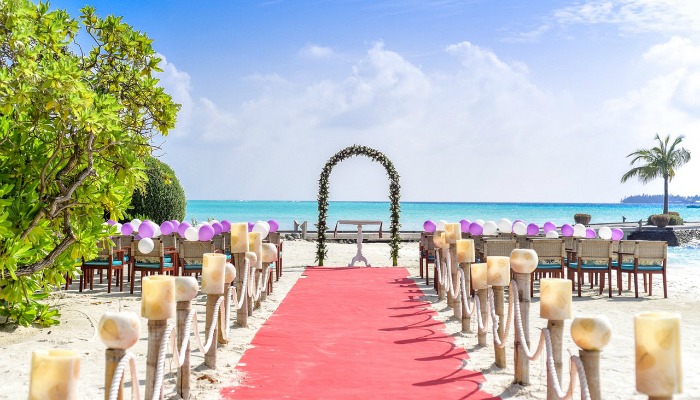Should I Stay or Should I Go? Pros and Cons of Destination Weddings

We may not admit it, but as children, many women imagined what their wedding day would look like: Cinderella-inspired wedding gowns, pink bridesmaid dresses, and inedible cake toppers. While childish, these whimsical daydreams form the basis of our adult hopes and dreams for an ideal wedding day.
Just as our taste in clothing and personal style evolve with age, so does our vision of a perfect wedding. This vision often undergoes another transformation with the introduction of a real-life partner, merging childhood dreams with new, jointly-crafted dreams.
Similar to the realities of marriage itself, choosing the type of wedding you want carries real-life implications. Many factors need consideration, including individual cultures, religions, budget, and personal taste. Once a couple commits to spending their lives together, discussions naturally progress to the type of ceremony and reception envisioned. This conversation can be complex, as wedding details are as unique as the individuals themselves. Decisions about location, style, and budget are paramount.
Perhaps the most significant decision regarding a wedding’s location is whether the nuptials will take place locally or at a destination. To help decide, listing the pros and cons of a destination wedding might clarify the choice for both the child and adult within us.

Pros:
Budget considerations: The average cost of a local or domestic wedding is approximately $35,000. A destination wedding is often a more affordable option.
Tip: Hiring a destination wedding planner can further reduce costs. Planners usually have firsthand knowledge of local vendors who can provide essential services at the destination, reducing the need for transporting flowers, cake, and décor. They are also aware of resorts offering packages and current promotions or deals.
Intimacy: A destination wedding is typically a more intimate affair. This not only saves money on food and drinks but also allows the couple to spend quality time with friends and family.
Tip: Consider collaborating with a destination wedding planner to organize a unique arts and crafts activity before the wedding, incorporating these items into the ceremony’s décor.
Family bonding: For couples from different regions or countries, a destination wedding offers an opportunity for both families to spend time together and get to know each other. Plus, it serves as an exciting vacation for both the couple and their guests.
Tip: Work with your planner to include authentic details in the ceremony and reception, allowing attendees to experience the local culture and cuisine.
Uniqueness: Today’s couples, especially millennials, seek weddings that reflect their unique interests and experiences. With 40% of millennials opting for destination weddings, the allure of incorporating distinctive details and locations is strong.
Tip: A good destination wedding planner will explore a variety of locations, presenting options that resonate with a couple’s unique interests.

Cons:
Planning challenges: Organizing a wedding from afar can be daunting, especially in a foreign country with different legal requirements for visas and licenses.
Tip: A seasoned destination wedding planner can navigate these legalities, ensuring everything is in order for both the couple and their guests.
Advance planning: Destination weddings require booking locations well in advance, often at least a year. For couples desiring a shorter engagement, this might not be ideal. Additionally, save-the-date cards should be sent out 9-12 months prior to allow guests adequate preparation time.
Attendance issues: Not everyone will be able to attend a destination wedding due to travel costs, inability to take vacation time, or physical limitations.
Tip: Organizing a post-wedding reception at home can include those unable to travel, ensuring no one misses out on celebrating your union.
Complex organization: A destination wedding entails managing a ceremony, reception, and vacation all in one, potentially thousands of kilometers away, which can be overwhelming.
Tip: Hiring a professional destination wedding planner can alleviate much of this stress, as they handle location scouting, activities, local vendors, décor, and travel arrangements for both the couple and their guests.
Choosing between a local and a destination wedding is significant. Our childhood dreams of grand gowns and elaborate cakes have evolved into adult desires for unique, memorable experiences in far-flung locales. Weighing the pros and cons helps in making an informed decision. However, opting for a destination wedding planner is as straightforward as saying “I do.”

Learn About our Event & Wedding Planning Certification

Frequently Asked Questions About Destination Weddings
The cost of a destination wedding can vary widely and may be cheaper or more expensive than a local wedding, depending on several factors such as the destination, the number of guests, and the type of ceremony and reception you desire.
While you might save on decor and guest count, you’ll need to consider travel and accommodation costs.
Traditionally, guests are responsible for covering their own travel and accommodation expenses for a destination wedding. The couple may choose to cover specific events, such as a welcome dinner or group excursions, but it’s not expected to pay for guests’ overall expenses.
The best destination wedding locations depend on the couple’s preferences, but popular choices include the Caribbean, Hawaii, Italy, Mexico, and France. These destinations offer beautiful scenery, romantic atmospheres, and often have experience hosting weddings for international couples.
To save money on a destination wedding, consider:
- Choosing a less popular date or off-peak season to get better rates.
- Limiting your guest list to close family and friends.
- Negotiating group rates for travel and accommodations.
- Selecting a location with natural beauty to reduce decor expenses.
An Event & Wedding Planner’s role involves strategic planning and savvy negotiation to ensure the couple’s dream wedding is both memorable and affordable. Here are insights into how event & wedding planners help clients save money for a destination wedding:
Understanding the Client’s Vision and Budget: Event & wedding planners begin with a detailed discussion about their clients’ wedding vision and budget. This foundational understanding guides all planning decisions and assists in prioritizing expenses effectively.
Choosing a Less Popular Date or Off-Peak Season: They guide clients on the benefits of selecting dates during the off-peak season. This can significantly reduce venue and vendor costs and potentially offer more date flexibility.
Limiting the Guest List: Event & wedding planners create a carefully considered guest list with the clients, emphasizing the intimacy and unique experience of destination weddings, which naturally lend themselves to smaller, more personal celebrations.
Negotiating Group Rates for Travel and Accommodations: Leveraging networks or partnering with travel agents, they negotiate discounted rates for flights and accommodations, simplifying the process for guests and reducing costs.
Selecting a Location with Natural Beauty: They assist clients in choosing stunning locations that require minimal additional decoration, leveraging the location’s inherent charm and beauty, significantly cutting down on décor expenses.
Leveraging Local Vendors: Event & wedding planners encourage the use of local vendors and materials, which can be more cost-effective than importing goods or services, adding an authentic touch to the wedding and making it more memorable.
Bundling Services: They seek venues and vendors who can bundle services, such as catering, decoration, and audio-visual needs, which can often be more affordable than hiring separate vendors for each service.
Digital Invitations: They suggest the use of digital invitations and RSVPs to save on printing and mailing costs. Many platforms offer elegant and customizable options suitable for destination weddings.
Wedding Insurance: Recommending investing in wedding insurance that covers destination specifics offers a safety net that can save money in the long run, covering unforeseen circumstances that could otherwise lead to financial loss.
Transparent Communication: Maintaining an open line of communication with clients throughout the planning process and regularly updating them on budget allocations and any potential savings ensures their expectations are managed realistically.
By applying these strategies, event & wedding planners can guide clients through planning a beautiful destination wedding that stays within their budget, reinforcing their value as knowledgeable and resourceful professionals.
To help a client turn their dream wedding into a reality, enroll in Ultimate Academy®’s Event & Wedding Planning course. This program covers the theoretical and practical components of event & wedding planning, as well as the business, sales, and marketing components of being an event & wedding planner.
Yes, it’s still customary to give a gift or money to the couple, even if you’re attending a destination wedding. However, guests may opt for a smaller or more personal gift considering the additional expenses of traveling to the wedding.
Destination weddings at an all-inclusive resort typically include a wedding package that covers the ceremony and reception basics, such as decor, catering, and coordination services.
Couples can customize their package to suit their preferences. Guests usually pay for their own rooms, benefiting from the resort’s amenities and activities throughout their stay.
The resort’s wedding planner often assists with organizing the details, making it a convenient option for couples looking for a seamless experience.













